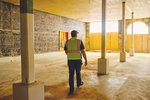


SILER CITY — Wren Farrar’s vision for Siler City’s renaissance is finally crystallizing after years of planning behind the scenes.
The great-grandson of L.L. Wren — one of Siler City’s pioneering, industry leaders of the early 20th century — Farrar has long vowed to resuscitate his ailing hometown. The first major step toward that goal is nearing completion. His company, Wren Industries, has almost finished renovations of several properties from 114 to 120 West Raleigh Street that will soon house a 16-unit apartment complex, a butcher’s shop and fine-dining brewery.
“This time last year we were still in the planning phase of everything,” Farrar told the News + Record. “We hadn’t started any of our projects — the apartment units, brewery, restaurant — and we were just right at the starting point of starting construction.”
More than a year and a half in pandemic complicated his plans, but development hasn’t wavered.
“We’ve just kind of had to take it on the chin and we’re plowing through,” Farrar said of would-be pandemic setbacks, such as wildly inflated materials costs. “I mean to us it’s more important to just go ahead and get our certificate of occupancy, get everything completed and get them up and renting.”
To populate the multi-million dollar commercial spaces, Farrar partnered with Chris Beal, director of operations at Tribeca Hospitality, which owns and operates Cary’s Tribeca Tavern, Fayetteville’s Mash House Brewing Company and WCC Cafe — a restaurant on the Carolina Hurricanes’ training grounds in Morrisville.
Beal, who grew up in Goldston and now lives on a 50-acre farm in Silk Hope, is another born-and-bred Chathamite looking to improve the county he loves.
“We’re just two local guys coming together to try to do something we hope the community is proud of,” he said.
Pending permit approvals, Siler City residents should see the first of the duo’s new projects, a butcher shop called Chatham Meat Company, by the end of December. Sometime in early 2022, an adjacent restaurant and brewery will open: Siler Station, “which comes from the original name of the town,” Beal said.
“A lot of people have their brew pubs,” he added. “But we’re going to have hand-cut steaks, which are local and pasture-raised. We’re offering shrimp and grits, and probably a pan-seared salmon, using local farmers’ own produce when we’re in season. So having handcrafted and local food that’s not just bar food, on top of being able to have the brewery aspect of it, it’s going to be pretty unique.”
Planning for the complex and other downtown projects began as early as 2015, but little had changed in the public eye before now.
“So finally we’re really starting to see some tangible accomplishments,” Farrar said, “insofar as getting tenants and the restaurant brewery and hopefully a lot of people living downtown will be enjoying what Siler City has to offer.”
The restaurant-brewery-apartment project, known as Wren Corner Properties, will include streetscape improvements and other area enhancements to elevate downtown’s aesthetic. All of it, though, is “only the beginning of hopefully even bigger things to come,” Farrar said.
“Our vision is really just to do whatever we can within our means and our existing real estate portfolio to revitalize the historic downtown central business district of Siler City,” he said.
Farrar’s primary focus is the North Chatham Avenue commercial corridor, where his company owns several properties, including the 56,000 square-foot Roland Thomas industrial building, which later housed Dinette World. Farrar would like to see the building reworked into a communal space akin to Raleigh’s Morgan Street Food Hall or Transfer Co. Food Hall.
“Maybe putting in something like that and a nice, permanent farmers’ market with vendor stands,” he said. “Or potentially we’re looking at partnering with a group to do a bourbon distillery.”
Other options include a Bavarian-styled beer garden, an event venue, a restaurant, a fitness gym and loft apartments on the second floor.
Whatever the final selection, tenants will have to match Farrar’s “master plan,” which encompasses two, complementary objectives: First, secure “anchor tenants” — strategic businesses such as restaurants, breweries and distilleries — to promote revived interest in Siler City’s downtown. And second, develop improved real estate options to accommodate the new residents downtown will attract.
“So that’s the sort of two-pronged approach of getting the people here,” Farrar said, “giving them a reason to be here and then giving them housing and lodging opportunities to live in.”
Siler City has long suffered from stagnancy compounded by the loss of industrial jobs. An infusion of fresh activity and commerce will combat the town’s slumping trajectory, Farrar hopes, and encourage more civic engagement.
“I think with the combination of getting people downtown full-time, 24/7, with more activities and whatnot, and the last year when all the businesses closed down and folks saw what that did,” he said, “people are going to want to take care of their neighborhoods. They’re going to take care of their downtown. They’re going to want to maintain it and for it to be a beautiful place for living and playing and working.”
Town representatives agree. For years, Siler City’s board of commissioners has sought to reignite the town’s once-thriving industrial backbone and resurrect the commercial scene. A central focus of the commissioners’ strategy has been downtown’s revitalization, and Farrar’s agenda is making their lives easier.
“The town is excited and appreciative of their desire to improve and revitalize the downtown business district, along with other areas of Siler City,” Town Manager Roy Lynch said of Farrar and his partners. “It is refreshing for those developers with a vision to give rise to a need and play a role in economic and social development. The mixed-use concept will have an essential, positive impact on the downtown area.”
Soon, Farrar hopes, Siler City and its downtown will resemble the bustling town he grew up in. And he’s proud to play a role in guaranteeing Siler City’s future health, much as his great-grandfather did 100 years ago.
“We’re very excited for the future of Siler City and we’re excited to be in a position where we can do this redevelopment and contribute to the revitalization efforts,” he said. “Siler City has always has been special. Maybe it’s been a couple of decades since that has been really quantified or qualified, but I think we’re at a point where it’s really going to become a neat place to be and a special place to live.”